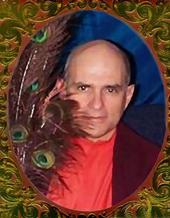Myspace Layouts at Pimp-My-Profile.com / Foxless
Swami Shankarananda Saraswati (Swamiji) is a meditation master in the powerful spiritual tradition of Kashmir Shaivism. This ancient yoga, which Swamiji calls Shiva Yoga, has been transmitted from master to student for thousands of years.Swami Shankarananda grew up in the Williamsburg section of Brooklyn, New York, the son of a well-known artist-cartoonist father and a high school teacher mother. A brilliant student, he played on the national championship chess team at Columbia University and became a United States chess master. He also received many academic awards, leading to an academic career and a teaching position at Indiana University, where he taught English literature and Renaissance poetry.In 1970, after meeting the American guru Ram Dass, Swamiji travelled to India, where he met many saints and stayed at the ashrams of many yogis. He practised Buddhist Vipassana meditation with Master Goenka, and hatha and raja yoga with Hari Das Baba. He spent time with Neem Karoli Baba, the great woman saint, Anandamayi Ma, and Sri Nisargadatta Maharaj.He also met one of India's leading spiritual masters, Swami Muktananda Paramahamsa, affectionately known as Baba, and lived at his ashram in Ganeshpuri, India, for three years. Swamiji was so impressed by Baba's talks on Shaivism, he collected and edited Baba's writings into a book, Siddha Meditation. Swamiji's groundbreaking essay introduced Baba's interpretation of Shaivism to the Western reading public. Later, Swamiji was invited to give the inaugural talk on Kashmir Shaivism at a significant month-long retreat with Muktananda in Arcata, California, 1975.The leading contemporary sage in the tradition of Kashmir Shaivism, Muktananda also possessed the power of shaktipat, described in Shaivism, in which a seeker can be spiritually awakened directly by touch, look, word or thought. Swamiji had a series of extraordinary experiences based on Baba's shaktipat, culminating eventually in Self-realization, the ultimate achievement in yoga.A few years later, the Mahamandaleshwar Brahmananda Giri initiated Swamiji into the ancient Saraswati order of monks. He was given the title Swami, which means teacher, an honour bestowed upon few Westerners. He was also given the name Shankarananda, which means, "the bliss of Shiva," or "bliss maker." In 1974 Baba instructed Swamiji in the method of shaktipat, spiritual initiation, and told him to awaken seekers and teach independently. At that time Baba wrote, "He [Shankarananda] has the power to make people experience the divine presence."Swamiji established the first American ashram of his tradition in Ann Arbor, Michigan. He founded the Siddha Path magazine in 1975 and for many years was its editor. He has written numerous articles on spiritual topics including a book of aphorisms, Voice of the Self. His book, Muktananda Siddha Guru, a lucid introduction to the teachings of Swami Muktananda, has been translated into German, Spanish and French. In 1986 Swamiji created the Shiva Institute in Los Angeles. During his period in Los Angeles he expanded his work in the field of meditation and developed the Shiva Process, a practical application of enlightened life in the world based on Kashmir Shaivism.In 1990, Swami Shankarananda was invited to Australia by his longtime friend and devotee Vilasini, to officially open and bless her Meditation Centre, 'Mylinga'. The tour was such a great success that the Shiva Meditation Centre was established, and Swamiji was invited to stay and teach. A beautiful permanent residence, the Shiva Ashram, was founded in 1996 in Mt. Eliza on the Mornington Peninsula, forty-five minutes south of Melbourne. In a short time it has become a popular and flourishing spiritual community attracting local and international visitors and students.Swamiji is one of the world's leading exponents of Kashmir Shaivism. He approaches this great philosophy from the perspective of a practical yogi. He often works from the classical texts of Kashmir Shaivism such as the Shiva Sutras, the Pratyabhijnahridayam and the writings of Abhinavagupta. He also draws on traditional sources including the Upanishads, the Tantras and the teachings of Patanjali, Shankaracharya, the Buddha, Jesus and the Hassidic masters. Among modern teachers, he refers to Nisargadatta, Ananda Mayi Ma, Sri Ramana Maharshi, Gurdjieff, Maurice Nicoll, P.D. Ouspensky, Sri Ramakrishna and of course, Swami Muktananda.Swamiji has toured the United States, Canada and India conducting meditation courses and workshops. He has spoken to a wide range of audiences including politicians, police officers, doctors, lawyers, firefighters, homemakers and college and university students. He has been the director of ashrams in Los Angeles, New York City and Melbourne, Australia. With a sharp intellect accompanied by a warmth, humour, wisdom and empathy that endear him to all, Swamiji is well loved for his extraordinary gift of making the mundane joyful. MyGen Profile Generator